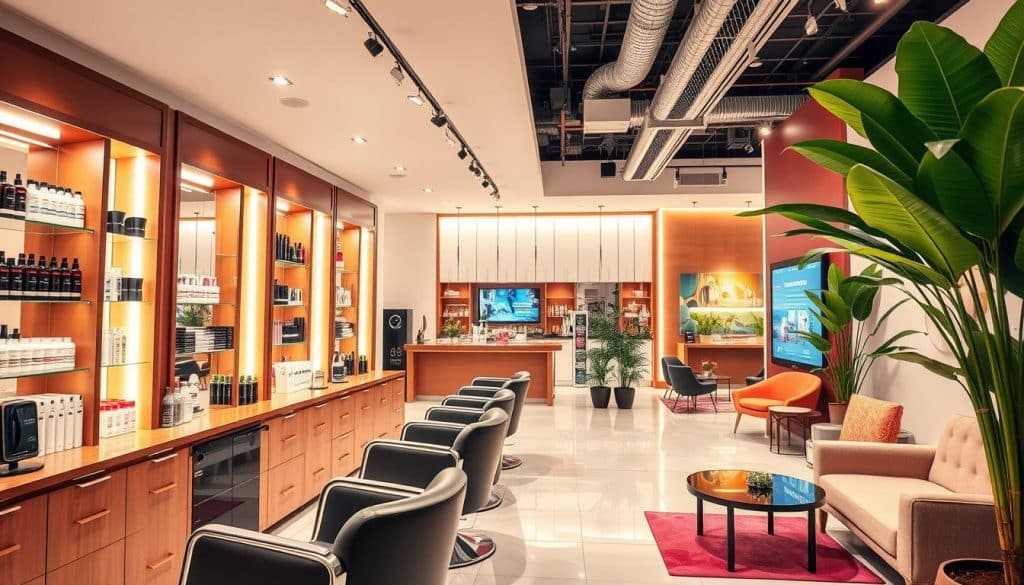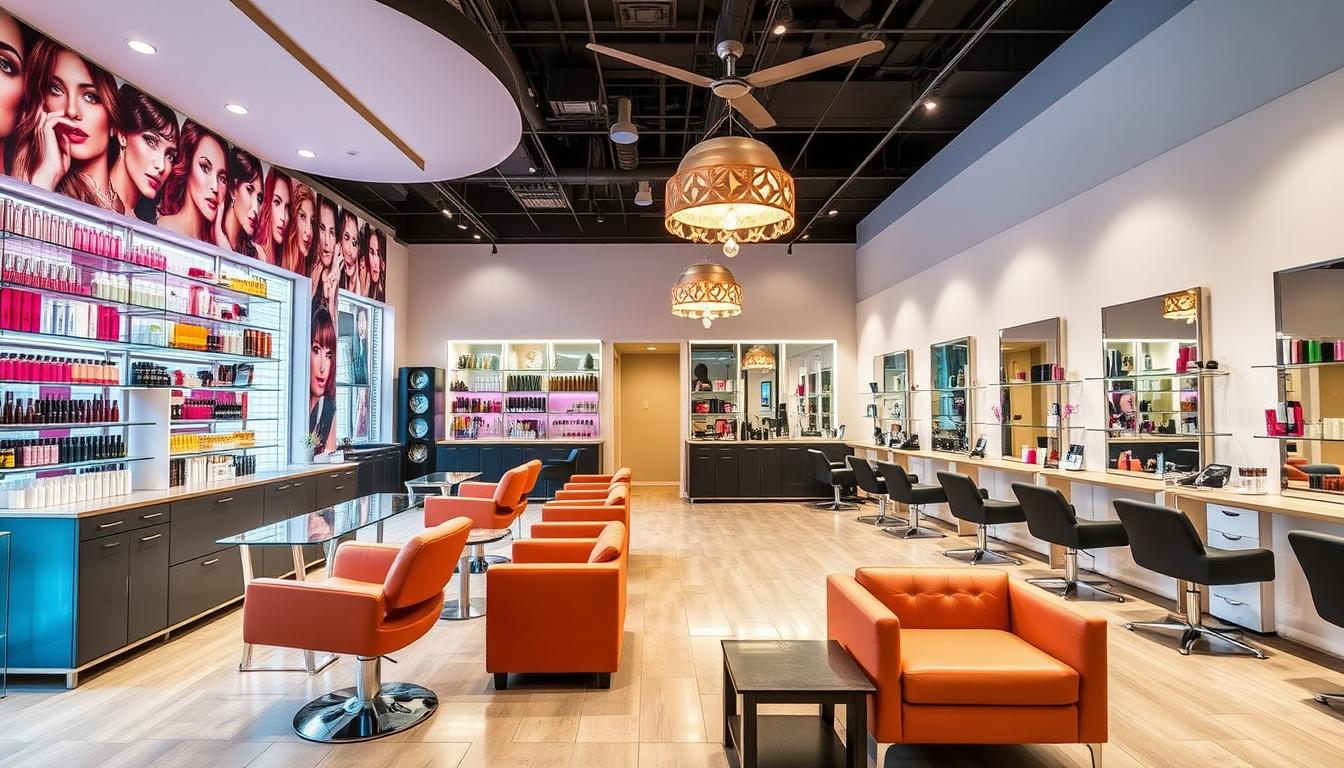Is investing in a beauty salon franchise the key to unlocking financial freedom in the booming beauty industry? The U.S. hair salon market is valued at over $46 billion annually. It’s expected to exceed $100 billion by 2027. Many aspiring entrepreneurs are drawn to this lucrative venture.
Consumer demand for grooming and self-care services is on the rise. Beauty franchise opportunities are emerging as a resilient business model, even amid economic uncertainty.
This article will explore the beauty salon franchise model. We’ll look at what makes a beauty salon franchise and popular brands. We’ll also discuss initial investment costs and essential factors for success.
Discovering insights and successful case studies can provide valuable knowledge. This knowledge is key for thriving in this dynamic market.
Key Takeaways
- The U.S. hair salon market is over $46 billion in value.
- An initial investment in a beauty salon franchise typically ranges from $200K to $400K.
- Franchise payback periods generally last between 3 to 5 years.
- Drybar has experienced a remarkable 200% unit growth rate over the past three years.
- Salon suite franchises offer a lower financial risk, appealing to beauty professionals.
- The beauty industry is historically recession-resistant.
Understanding the Beauty Salon Franchise Model
The beauty salon franchise model lets entrepreneurs run a business with a well-known brand. They get support and resources. Franchisees pay a fee upfront and royalties later. This helps them use an established customer base and training programs.
Buying a beauty salon franchise is a safer choice than starting alone. It offers a clear path to success.
What is a Beauty Salon Franchise?
A beauty salon franchise lets people run a salon with a well-known brand. It makes starting a business easier. Franchisees pay a fee and follow rules set by the franchisor.
Benefits of Franchising
Franchising in the beauty salon industry has many benefits. It gives access to a strong brand and a customer base. It also offers training and support.
For beauty entrepreneurs, franchising simplifies operations. It lets them focus on their services and clients. This leads to success in the beauty salon franchise investment.
Key Industry Trends
The beauty salon industry is changing, with more people wanting specialized services. A 10% increase in regular customers shows this trend. There’s a growing demand for services like men’s grooming and salon suites.
As the industry grows, it’s important for investors to consider these trends. They help guide decisions in the beauty salon business model.
Popular Beauty Salon Franchise Brands
The beauty salon franchise world has many brands, each with its own special offers and appeal. Great Clips, Supercuts, and Sport Clips are among the most popular. They are known for their strong presence and appealing business models.
Great Clips
Great Clips has been a top choice in the beauty salon franchise world for over 40 years. It has more than 4,400 locations in North America. It’s famous for its walk-in services and good prices, attracting many customers.
Starting a Great Clips franchise costs about $150,000. This investment can lead to a big share of the $46 billion U.S. hair salon market.
Supercuts
Supercuts was founded in 1975 and focuses on quick and affordable haircuts. It has over 2,300 locations. The cost to start a Supercuts franchise is around $200,000.
This investment fits with the trend of top beauty franchises targeting a wide range of customers.
Sport Clips
Sport Clips is unique, targeting mainly male customers with its sports theme. It started in 1993 and has become very popular. The cost to start a Sport Clips franchise is between $266,300 and $439,500.
This makes it a strong competitor among beauty salon franchises, thanks to its focused market strategy.
Initial Investment and Costs
Thinking about starting a beauty salon franchise? It’s key to know all the costs. You’ll need to look at franchise fees, equipment, supplies, and ongoing royalties. This helps figure out if it’s a good idea.
Franchise Fees
The cost to start varies by brand. Fees can be from $10,000 to $59,500. For example, Shubh Beauty asks for about $30,000. These fees help with brand support, training, and more, adding up to a big part of the start-up costs.
Equipment and Supply Costs
Opening a salon means big investments in gear and supplies. Costs for furniture, equipment, and inventory can be from $15,000 to $42,000. You’ll also need to pay for salon setup, which can cost between $15,000 and $50,000. Overall, starting a salon can cost between $169,000 and $301,000, based on location and needs.
Ongoing Royalties
Don’t forget about ongoing costs like royalties. Beauty salon franchises usually charge 6% of sales. Some, like Shubh Beauty, might also ask for a marketing fee of 1% to 2%. These costs are important to consider when planning your finances.
Selecting the Right Location
Finding the perfect spot for a beauty salon franchise is key to success. You need to think about several important factors. Local demographics help you know who might visit your salon. The foot traffic in the area shows how likely you are to get customers.
Knowing what other salons are doing in the area is also important. It helps you see where you can stand out and where you might face challenges.
Factors to Consider
When picking a location, look at a few things. How easy it is for people to find your salon is important. Also, check if there’s a demand for beauty services in the area.
Make sure you follow local laws about where you can operate. Knowing what you’ll pay for rent and what the lease says can save you from surprises.
Market Research Tips
Doing your homework on the market is essential. Look at who lives nearby to guess what beauty services they might want. See how many other salons there are to find out if there’s room for yours.
Use resources like the International Franchise Association for help. Keep up with beauty trends to make sure your salon offers what people want.

Training and Support Offered
Beauty salon franchising comes with a big plus: lots of training and support. It’s key to know how to run a salon well in a tough market. Franchisees get training on customer service, how to run the salon, and following brand rules.
This training makes sure every salon offers the same great experience. It’s all about keeping things consistent.
Initial Training Programs
New franchisees get into a detailed training program. It teaches them the best ways to do things and important rules to follow. They learn about products, how to deal with customers, and the brand’s image.
Getting help from the franchisor during this time is super important. It helps them understand the industry better and sets them up for success in the long run.
Ongoing Support Structures
After they start, franchisees get ongoing help to grow and stay up-to-date. They get new marketing stuff, updated manuals, and tips on the latest trends. This support boosts their performance and keeps the brand’s quality high.
Marketing and Brand Promotion Strategies
Effective marketing and brand promotion are key for beauty salon franchises to succeed. They use well-known brands to draw in customers. With the beauty service market expected to grow, it’s vital to have strong marketing plans. These plans should make the salon more visible and keep customers coming back.
Benefits of Brand Recognition
A strong brand can sway customer choices in the beauty world. When people know a brand, they trust it more. This trust helps attract and keep customers.
Most first impressions come from websites, making a good online look important. Being consistent in branding makes a salon stand out. This makes it easier for customers to remember.
Local Marketing Techniques
Using local marketing can help a salon reach more people in its area. Joining local events, using social media, and running special deals can build a loyal customer base.
Platforms like Facebook, Instagram, and TikTok are great for talking directly to people. Personalized email campaigns can also reach customers effectively. These methods help a salon get noticed and connect with more people.

Legal Considerations in Franchising
Entering the world of franchising requires a deep understanding of the legal side. Knowing about legal considerations is key to following the rules and avoiding confusion. It’s important to grasp the Franchise Disclosure Document (FDD) and the franchise agreements before you sign anything.
Franchise Disclosure Document (FDD)
The Franchise Disclosure Document (FDD) is a detailed guide to the franchise system. It covers fees, what you must do, and your rights. By law, franchisors must give this document to those interested at least 14 days before signing.
Reading the FDD carefully is a must. It helps you understand what you’re getting into. This step is important for protecting yourself and knowing what to expect.
Understanding Franchise Agreements
Franchise agreements set out the rules and relationship between you and the franchisor. It’s vital to have clear agreements from the start. These contracts cover important topics like support, rules, and how to end the agreement.
Working with lawyers who know franchise law is a smart move. They can help you understand your duties and protect your interests.
Success Stories in Beauty Salon Franchising
The beauty salon franchise world is full of amazing stories of success. Erin Elgin, a business owner, joined Sola Salons for its unlimited growth and the chance to run her own show. She learned the key to success is being friendly, using local marketing, and connecting well with clients.
Elgin also found that having strong support and the latest technology made franchising appealing. These elements are key to the model’s success.
Elgin advises future franchise owners to balance work and life, celebrate wins, and hire wisely. Trusting your gut is also vital. Her story is a testament to passion, planning, and perseverance in the beauty salon world.
Martha Matilda Harper’s success is another example of franchising’s power. Her company grew across many continents, showing the strength of franchise partnerships. Building strong relationships between partners and franchisors is essential for everyone’s success.
The beauty salon franchise sector is booming, with over 805,500 establishments in the U.S. These businesses boost the economy and create jobs for millions. The chance to make a mark in the beauty industry keeps many motivated.
Future of Beauty Salon Franchises
The beauty salon franchise world is set to boom, thanks to new trends. People want more personalized and eco-friendly beauty services. Also, using technology like online booking systems can make things better for both franchisees and customers.
Emerging Trends
Wellness and self-care are becoming big in the beauty world. Over half of beauty customers buy retail items, which is good news for places like Glamourax salon. They saw a big jump in sales by focusing on commission.
More people want to pay without touching anything and get reminders by text. Salons that listen to these needs will stand out.
Predictions for Growth
The hair care market is expected to hit $111.98 billion by 2026. This is great news for salon franchises. Men’s grooming is also on the rise, which is good for brands like Sport Clips.
Franchisees need to keep up with trends like better customer service and using technology. This will help them grow in the beauty salon franchise world.





